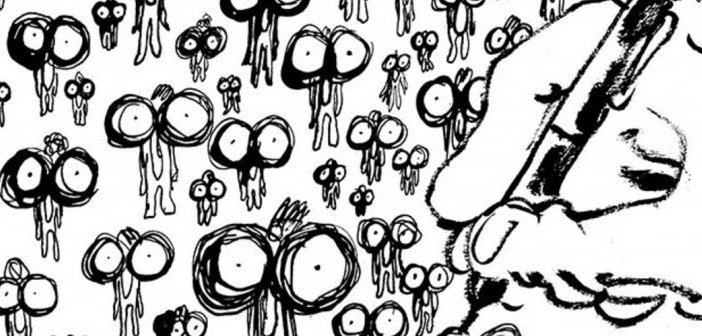The Lit Review |29|Festival Season
Festival Season
The weather may still be atrocious, we may indeed feel like we are merely edging out of spring, but summer is officially here (apparently) and we drowned rats have some festivals to look forward to. Check out the latest below:
Listowel Writers’ Week launched yesterday evening and will take place all weekend. Operation Education is taking place today; it includes a conversation with poet Paul Durcan and an appearance by Temper-Mental MissElayneous, who uses hip-hop and spoken word to communicate her politicised messages. There are also a few spaces left on the creative writing workshops for those eager to put pen to paper. You can make a booking here.
Hay Festival is happening this year in fifteen locations across Europe, Asia, Latin America, Africa and the Middle East. The original festival, which began in Wales, celebrates stories and sustainability. In Ireland, it is scheduled to take place in Kells this year, but will also happen in places like Mexico, Dhaka in Bangladesh, Arequipa in Peru and other spectacular destinations around the world. ‘Join us to imagine the world as it is and as it might be’ is their slogan for 2015. It sounds glorious. Let’s all go to Peru.
Why does Yeats still resonate so deeply with his readers? How, after 150 years, do this beloved poet’s words still stir a sense of nostalgia and romance within us? The Dalkey Book Festival, set to take place in June, will attempt to answer just that. Yeats in Love puts this question to a panel of speakers including Poet Laureate of Dalkey, Gary Jermyn; Abbey Theatre Director, Fiach Mac Conghail; Artistic Director of the Ark, Aideen Howard; Annie West, illustrator of the wonderful Yeats in Love collection, and writer and Horslips frontman Barry Devlin. This event takes place as part of the programme for ‘the best little festival in the world’, according to Salman Rushdie. Events run from June 11th to 14th.
Charlie Survivor writes ‘Catharsis’

On January 7th, Renald Luzier, otherwise known as Luz, turned up one hour late for work. This small disturbance to his day meant that Luz survived the fatal attack in the Charlie Hebdo offices that claimed the lives of his friends and colleagues. Following this incident, Luz honoured his peers by publishing an edition of the satirical newspaper, after which he withdrew from the media, harbouring a sense of loss and guilt. It was these overwhelming feelings that forced Luz to tap into his talent as an illustrator and channel his grief in the shape of his new, aptly-named book, Catharsis. The book is a ‘kaleidoscope of emotions… in which the caricaturist works through his memories and nightmares.’ The book was published in French last Wednesday, 21st of May.
Man International Booker Prize 2015
László Krasznahorkai has been selected as the winner of the 2015 Man International Booker Prize, the first time the prize has been awarded to a Hungarian writer. The award is granted every six years and acknowledges the individual based on their overall contribution to literature as opposed to one single book. Krasznahorkai’s writings explore dystopian apocalyptic themes, and his work is sometimes seen as challenging and melancholic. This article praises the author’s skilful writing, saying: ‘He can be lethal in his portraits of us human beings, yet also funny.’ Marina Warner, a member of the judging panel this year, describes Krasznahorkai as a ‘visionary writer of extraordinary intensity and vocal range.’
Secret Stories

I have both good news and bad news. The good news is that Margaret Atwood has written a new book. The bad news is that none of you will read it in your lifetime, unless you have magically come upon the Elixir of Life. Oslo’s ‘Future Library’ project has graciously accepted Scribbler Moon, Atwood’s latest work, and will continue to gather a book from a different author each year and seal it away in secret until 2114. Then, after 100 great stories have been collected, the 1,000 trees which have been planted for the project in a forest just outside Oslo will be cut down to provide paper for the publication of these hidden stories. This is a very special project and a true display of human creativity. A huge amount of consideration has gone into its conception. I’m not going to lie, though; I’m pretty upset that I won’t be around to read the host of great manuscripts, particularly the one entitled Scribbler Moon. But I imagine they’re fairly set on the timeline at this point. Margaret Atwood has commented on her involvement in this special plan, saying: ‘This project at least believes we will be around in 100 years’, which instils some sense of hope for our future (I think).
Write a Novella
The novella can be a literary afterthought, never long enough to take shape as a novel and with too much to say to sit happily as a short story. However, the Penny Dreadful Novella Prize is open for submissions on Monday 1st of June. John Keating and Marc O’Connell, writing in the Irish Times, applaud the magic and beauty of the novella, saying: ‘we are challenging authors to look at the rich history of a vibrant, elastic and living literary form and attempt to remake it in their own image.’ Judge for this year’s competition, Paul McVeigh, says ‘the novella should have both the depth of the short story and the breadth of the novel. The novella has been called the sonata to the novel’s symphony. It has been called the first-born child of the fledgling writer and the confident roar of the literary veteran.’ The winner of this year’s prize will be awarded €2,000, as well as publication in The Dreadful Press. Submissions open in June and close in September with a word limit of 15,000-35,000 words. Find all details here.
